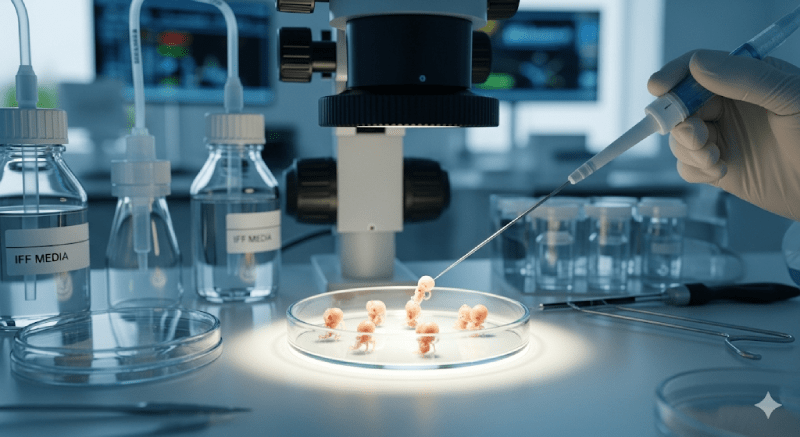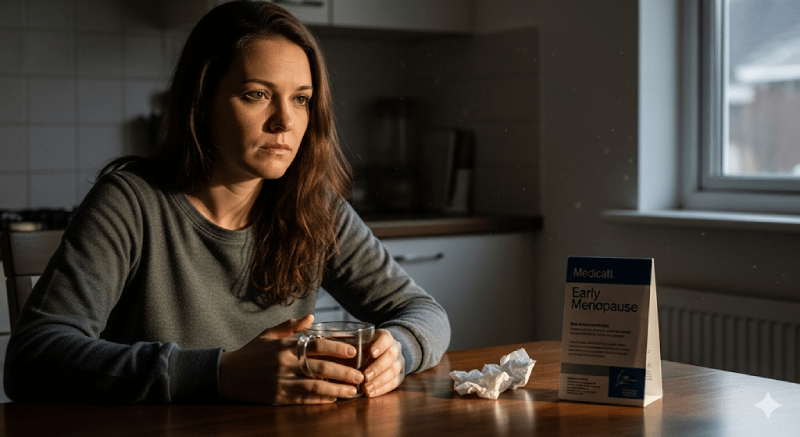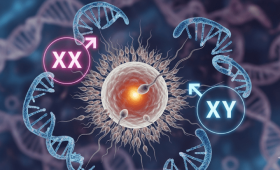What are Early Menopause and Ovarian Insufficiency?
Menopause is a biological process characterized by the natural cessation of a woman’s menstrual cycle and a significant drop in hormone levels. This transition, which typically begins after the age of 45, can also occur at an earlier age in conditions known as early menopause or premature ovarian failure (POF). While these two terms are often used interchangeably, they have technical differences.
Premature Ovarian Failure (POF) is the loss of ovarian function before the age of 40. The ovaries become unable to produce sufficient levels of hormones like estrogen and progesterone, and egg release becomes irregular or stops. This condition manifests with menstrual irregularities and menopause-like symptoms, but in some women with this diagnosis, ovarian function may temporarily return, or rare spontaneous pregnancies may occur. Therefore, a diagnosis of POF does not mean the ovaries are completely “depleted.”
Early Menopause, on the other hand, refers to the menopausal process that begins between the ages of 40 and 45. This is characterized by the permanent cessation of menstrual cycles and the onset of menopausal symptoms. Unlike POF, the likelihood of ovarian function returning in early menopause is very low. Both conditions can significantly affect a woman’s quality of life, overall health, and fertility. The body’s inability to produce enough estrogen can lead to a decrease in bone density, an increased risk of heart disease, and other systemic effects.
Causes and Risk Factors of Early Menopause
The underlying causes of early menopause are quite diverse, and in some cases, a definitive cause cannot be determined. Genetic, autoimmune, surgical, and environmental factors can play a role in the emergence of this complex condition.
Genetic and Autoimmune Factors
- Genetic Factors: One of the most common causes of early menopause is genetic predisposition. Women with a family history of early menopause have a higher risk. For example, certain X chromosome anomalies (e.g., Fragile X carrier status) or specific gene mutations can cause the ovaries to age and lose function earlier than normal.
- Autoimmune Disorders: Autoimmune diseases, where the immune system attacks its own body tissues, are a significant cause of ovarian failure. Conditions like lupus, rheumatoid arthritis, and thyroiditis (such as Hashimoto’s disease) can cause immune cells to damage ovarian tissue and inhibit hormone production.

Medical Treatments and Surgical Procedures
- Chemotherapy and Radiation Therapy: Cancer treatments, especially chemotherapy and radiation applied to the abdomen or pelvic area, can have a direct toxic effect on ovarian cells, leading to ovarian failure. The dose and duration of these treatments determine the degree of damage to the ovaries.
- Ovariectomy (Removal of Ovaries): The surgical removal of both ovaries (bilateral oophorectomy) naturally leads to immediate menopause. This is typically done due to the risk of ovarian cancer or other serious medical conditions.
- Hysterectomy (Removal of the Uterus): While the removal of only the uterus ends the menstrual cycle, it does not stop hormonal production if the ovaries remain in place and does not cause menopause. However, some studies suggest that a hysterectomy may affect blood flow to the ovaries, potentially advancing menopause by one or two years.
Lifestyle and Environmental Factors
- Smoking: Smoking is one of the strongest known environmental risk factors for early menopause. The toxins in cigarettes disrupt ovarian function, reduce estrogen production, and can cause menopause to start an average of 1-2 years earlier.
- Alcohol Consumption: Excessive alcohol consumption can disrupt hormonal balance and damage the reproductive system, increasing the risk of ovarian failure.
- Nutrition and Obesity: A poor and nutrient-deficient diet can negatively affect the body’s hormonal balance. Similarly, being overweight or obese can contribute to hormonal imbalances and an increased risk of early menopause.
- Chronic Stress: Constant and high levels of stress increase the release of stress hormones like cortisol. This can suppress the production of reproductive hormones, disrupting hormonal balance and triggering early menopause.
Symptoms of Early Menopause
The symptoms of early menopause largely overlap with those of natural menopause, but the appearance of these symptoms at a younger age is important for diagnosis. These symptoms can seriously affect a woman’s physical and mental health.
- Menstrual Irregularities: The earliest and most prominent symptom is the menstrual cycle becoming shorter, longer, irregular, or stopping entirely.
- Hot Flashes and Night Sweats: A sudden feeling of body heat and this condition disrupting sleep at night are typical symptoms of low estrogen.
- Vaginal Dryness: The loss of elasticity and moisture in vaginal tissues can lead to discomfort and pain during sexual intercourse.
- Sleep Problems: Insomnia and difficulty falling asleep can be related to hot flashes or hormonal changes.
- Mood Swings: Fluctuations in estrogen levels can cause irritability, anxiety, depression, and sudden changes in mood.
- Decreased Sexual Desire: Low estrogen levels can have a negative impact on libido (sexual desire).
- Physical Changes: Weight gain, especially in the abdominal area, hair loss, dry skin, and joint pain can also be present.
- Concentration Problems: Memory impairment and difficulty concentrating are common cognitive symptoms in women experiencing early menopause.
Diagnosis and Treatment Methods
The first step for a woman with suspected early menopause is to consult an obstetrician-gynecologist. The doctor will evaluate the symptoms, take a detailed medical history, and order necessary tests.
Diagnosis Process
- Physical Examination and History Taking: The doctor will inquire about the patient’s symptoms, family history, and lifestyle habits.
- Hormone Tests: Blood tests are the most important step in making a diagnosis. Follicle-Stimulating Hormone (FSH) and Luteinizing Hormone (LH) levels will be elevated, while estrogen (estradiol) levels will be low, indicating ovarian failure.
- Other Tests: If necessary, thyroid function tests, autoimmune antibody tests, and genetic tests may be requested.
Treatment Methods
Treatment for early menopause focuses on alleviating symptoms, preserving bone density, and reducing overall health risks.
- Hormone Replacement Therapy (HRT): This is the most common and effective treatment method. HRT replaces the missing estrogen and progesterone hormones to alleviate symptoms like hot flashes, vaginal dryness, and sleep problems. It also preserves bone density and reduces the future risk of osteoporosis. HRT should be used at least until the natural age of menopause (average 51).
- Lifestyle Changes: A healthy diet, regular exercise, and stress management are critical in managing symptoms and supporting overall health. Calcium and Vitamin D supplements are especially important for protecting bone health.
- Alternative Therapies: While alternative therapies like herbal supplements or acupuncture may provide some symptom relief, they are not sufficient on their own to prevent serious health problems. They should not be considered a substitute for HRT.
- Psychological Support: Due to the emotional and psychological challenges posed by early menopause, seeking therapy or joining support groups can help in coping with the process.
Early Menopause and Pregnancy: Fertility Options
For women diagnosed with early menopause, fertility is a major concern. Natural conception is extremely difficult due to diminished ovarian function, but not impossible. For the vast majority of these women, assisted reproductive technologies are the most promising path to having a child.
- Possibility of Natural Pregnancy: In about 5% to 10% of women diagnosed with early menopause, ovarian function may temporarily return, and spontaneous pregnancies can occur, albeit rarely. However, this rate is quite low, and therefore, relying on natural methods alone for pregnancy is not recommended.
- Assisted Reproductive Technologies: In Vitro Fertilization (IVF) is the most successful method for women in this situation. For women whose ovarian function has not completely ceased and whose egg reserve has not yet been depleted, an IVF attempt can be made using their own eggs. However, low egg quality or a small number of eggs can affect the success rate.
- Egg Donation: If IVF treatment with one’s own eggs is unsuccessful or the ovarian reserve is completely depleted, the option with the highest success rate is egg donation. In this method, an embryo is created using a healthy donor’s eggs, and this embryo is transferred to the woman’s uterus. Egg donation offers women with early menopause the highest chance of having a child.
- Embryo Donation: Another option is the transfer of an embryo created using both donor eggs and donor sperm. This can be considered in cases where both egg and sperm quality are insufficient.

The Journey to Having a Child with Early Menopause
This journey can be both physically and emotionally challenging. Therefore, it is of great importance to receive both physical and psychological support before and during treatment.
- Detailed Evaluation: Before starting treatment, a detailed evaluation by a reproductive endocrinologist or IVF specialist should be performed. This evaluation is necessary to determine the ovarian reserve (with AMH and FSH tests), check the suitability of the uterus for pregnancy, and create the most appropriate treatment plan.
- Psychological Support: A diagnosis of infertility and early menopause can deeply affect a woman’s self-esteem and emotional health. Seeking help from a therapist or a support group during this process can assist in coping with anxiety and depression.
- Accurate Information: It is crucial to be wary of misinformation on the internet and to get information about treatment options only from reliable sources and specialist doctors. Every case is different and requires a personalized treatment plan.
Early menopause can be an unexpected and challenging turning point in a woman’s life. However, thanks to modern medicine, the symptoms of this condition can be managed, and the dreams of having a child can become a reality. One of the most important steps in this process is to consult a specialist without delay for an accurate diagnosis and treatment.
This draft provides a broad overview of early menopause and ovarian insufficiency, giving you a comprehensive foundation to start with. You can personalize the text by adding more specific details or by approaching it from a different angle. For example, we could focus more on the details of nutrition and lifestyle changes or add a section on emotional coping strategies. In which direction would you like me to expand this guide for you?
A Serene Journey for Your Early Menopause Treatment
A diagnosis of early menopause or premature ovarian failure (POF) can be an unexpected and challenging turning point in a woman’s life. The irregular menstrual cycles, hot flashes, mood swings, and, most importantly, fertility concerns that come with this condition can create a process that is difficult to overcome alone.
But you don’t have to walk this difficult path by yourself. At Cure Holiday, we are by your side with a holistic approach to early menopause and ovarian insufficiency treatment, where you can heal both your body and your soul. Unlike conventional treatment centers, we offer you a serene healing environment in the comfort of a holiday, in the heart of nature.
Why Cure Holiday?
- Personalized Treatment Plans: There is no one-size-fits-all solution for early menopause treatment. Our experienced team of experts determines the most suitable treatment path for you, from hormone replacement therapy (HRT) to advanced in vitro fertilization (IVF) applications and egg donation. We are with you every step of the way, providing scientific and empathetic answers to all your questions.
- Holistic and Serene Environment: Stress is one of the most significant triggers of early menopause. We believe that your treatment process should not only be medical but also psychologically and emotionally supported. With the psychological counseling services, yoga, meditation, and healthy eating programs offered at our facilities, you can strengthen your body and mind.
- Natural Beauty and Rejuvenation: As part of your healing process, you can relax at our facilities with sea views, benefit from our healing thermal waters, and refresh your soul with nature walks. By offering a combination of treatment and relaxation, Cure Holiday transforms this process into a journey of rejuvenation.
Fertility Options in Early Menopause
Early menopause does not have to put an end to your dreams of becoming a mother. Egg donation is one of the assisted reproductive technologies with the highest success rate for women experiencing early menopause. Our expert team provides you with the best service in this process by using the most advanced techniques.
At Cure Holiday, you are not just getting a treatment, but also a chance to make a new start in your life.
Contact us today to make a peaceful and healthy start to your life, overcome the challenges of early menopause, and make your dreams of having a child a reality.



